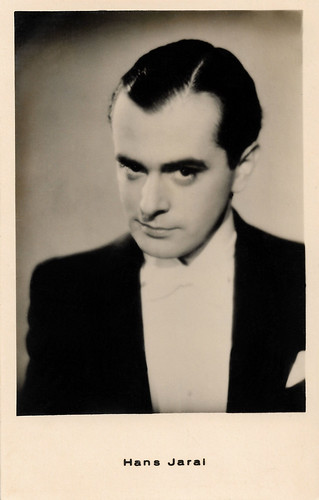
German postcard by Ross Verlag, no. 8087/1, 1933-1934. Photo: Willinger, Vienna. Hans Jaray, probably in the Franz Schubert biopic Leise fliehen meine Lieder/Gently My Songs Entreat (Willi Forst, 1933), while in 1934 an alternative language version was released in English, also with Jaray: Unfinished Symphony (Willi Forst, Anthony Asquith, 1934).

Latvian postcard by Argenta, sent by mail in 1935. Hans Jaray in Ball im Savoy/Ball at the Savoy (István Székely a.k.a. Steve Sekely, 1935).

Luxembourgish postcard. Hans Jaray in the title role of the Austrian film Der Pfarrer von Kirchfeld/L'Amour du ciel/The Priest of Kirchfeld (Jakob & Luise Fleck, 1937). Postcard with inkstamp for the Cinema Capitole, Luxembourg.
Playing Franz Schubert
Johann Alexander Jaray was born in 1906 in Vienna, Austria-Hungary. He was the son of the interior designer Karl Hans Jaray and his wife, Valerie Jaray. His parents divorced during his childhood, so the future actor grew up partly in the care of his God-fearing Jewish grandmother in Gmunden.
He attended the Friedberg Institute boarding school in Dresden during the First World War and later the Theresianum in his home town, where his acting talent was first discovered. Against his father's resistance, but with the support of his mother and stepmother Lili Marberg, Jaray successfully applied to the Academy of Music and Performing Arts in Vienna. His class included Paula Wessely, Käthe Gold, Karl Paryla, Albin Skoda and Siegfried Breuer.
His stage debut was in 1923 in the Wiener Volkstheater. Here, Jaray also played his first leading role as a student alongside Albert Bassermann in 'Traumulus' by Arno Holz and Oskar Jeschke. He was engaged at the Neuen Wiener Bühne and then from 1925 to 1930 at the Volkstheater.
From 1930 to 1938, he played at the Theater in der Josefstadt under Max Reinhardt. His comedy 'Ist Geraldine ein Engel?' (Is Geraldine an Angel?) was performed under the pseudonym Hans Honneg with Jaray and Paula Wessely in the leading roles as a Christmas premiere at the Josefstadt.
His two first films were the comedy Schwiegersöhne/Sons in law (Hans Steinhoff, 1926) starring Pat & Patachon and the drama Die Liebe der Jeanne Ney/The Love of Jeanne Ney (Georg Wilhelm Pabst, 1927) with Édith Jéhanne. In 1933, he played Franz Schubert in Leise flehen meine Lieder/Unfinished Symphony (Willi Forst, 1933) with Mártha Eggerth. Through this role, Hans Jaray became one of the best-known film actors in Germany and Austria.

Latvian postcard by JDA, Riga, no. 1665.

Latvian postcard by JDA, Riga, no. 1990. Photo: Elektafilm.

Latvian postcard. Hans Jaray in Ball im Savoy/The Ball at the Savoy (Steve Székely, 1935), scripted by Hermann Kosterlitz (Henry Koster) and Géza von Cziffra.

Latvian postcard by JDA, Riga, no. 994. Iren Agay and Hans Jaray in Hoheit tanzt Walzer/Her Highness Dances the Waltz (Max Neufeld, 1935).
A love affair withg Dietrich
After that, Hans Jaray went back to Austria to flee the Nazis. He was in a relationship with Paula Wessely at the time he entered into a love affair with Marlene Dietrich around 1934.
He played parish priest Peter Hell in the film Der Pfarrer von Kirchfeld/The Priest from Kirchfeld (Jacob Fleck and Luise Fleck, 1937), based on the novel by Austrian playwright Ludwig Anzengruber. Being a Jew, he emigrated after the Anschluss (the occupation of Austria by Nazi Germany in 1938) to the USA via Zurich and Paris with his partner at the time, Lili Darvas.
In New York, he played on Broadway. In 1942 he was one of the co-founders of the troupe The Players from Abroad, which consisted mainly of actors who had fled. His two Hollywood films were Lydia (Julien Duvivier, 1941) starring Merle Oberon and Carnegie Hall (Edgar G. Ulmer, 1947), credited as Hans Yaray.
In 1948, he returned to Vienna and joined the Volkstheater. From 1951 he was a member of the Theater in der Josefstadt and in 1986, he became an honorary member. Among his last films were Frühlingsstimmen/Voices of Spring (Hans Thimig, 1952) and after a long absence from the screen, Fedora (Billy Wilder, 1978) with Marthe Keller and Hildegard Knef. In 1960 he became head of the school of dramatic art, the Max Reinhardt Seminar.
He wrote eight plays and several books. In 1948, he, published in the USA the novel 'One Day Missing'. His life story 'Was ich kaum erträumen konnte...' (What I could hardly dream...), written shortly before his death, was published posthumously in 1990. Hans Jaray passed away in 1990 in Vienna. His honorary grave is in the Hietzinger Friedhof (Hietzing cemetery) in Vienna.

Dutch photo. Front of the Rembrandt Theater in Amsterdam, The Netherlands. On show was Leise flehen meine Lieder (Willi Forst, 1933), starring Marta Eggerth, Hans Jaray and Hans Moser. A gift by Roloff de Jeu.

Latvian postcard by JDA, Riga, no. 2175. Iren Agay and Hans Jaray in Hoheit tanzt Walzer/Her Highness Dances the Waltz (Max Neufeld, 1935).

Latvian postcard by Argenta.

Dutch promotion postcard for Capitol Theater. Hans Jaray in Frühlingsstimmen/Voices of Spring (Hans Thimig, 1952).
Sources: Rudi Polt (IMDb), CSFD (Czech), Wikipedia (German and English) and IMDb.
No comments:
Post a Comment